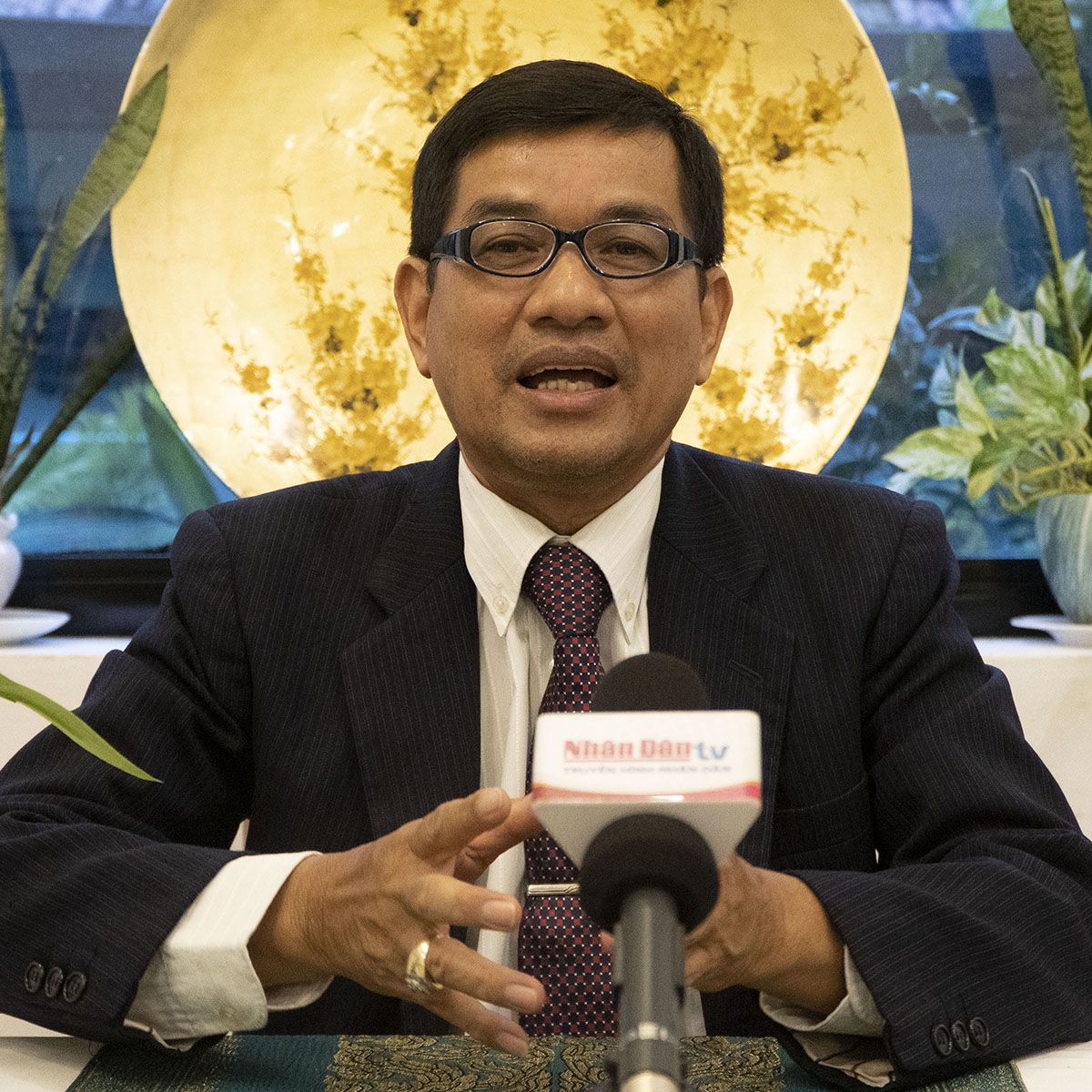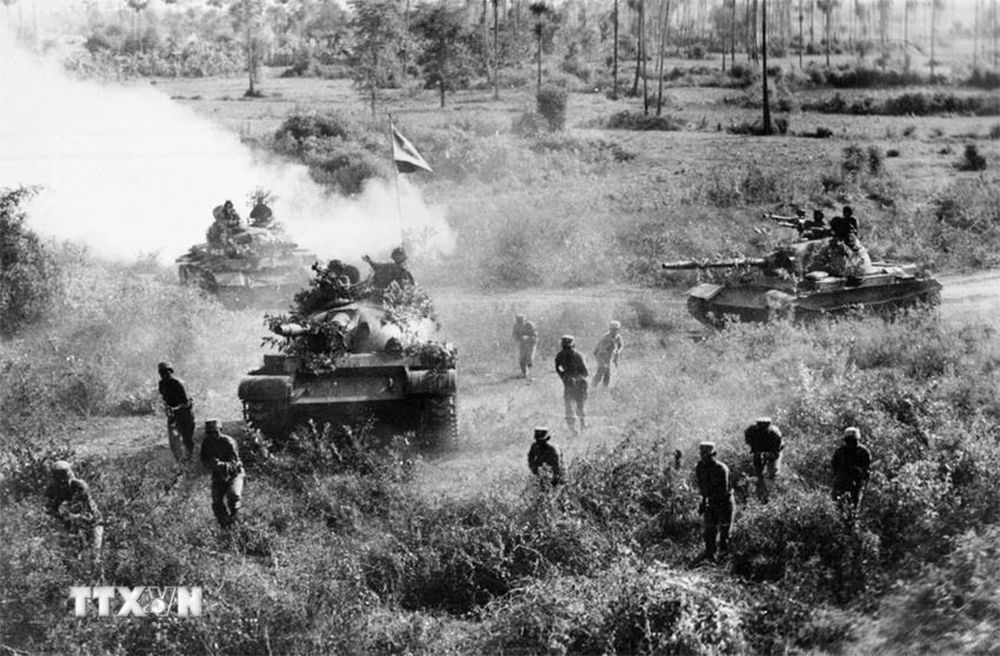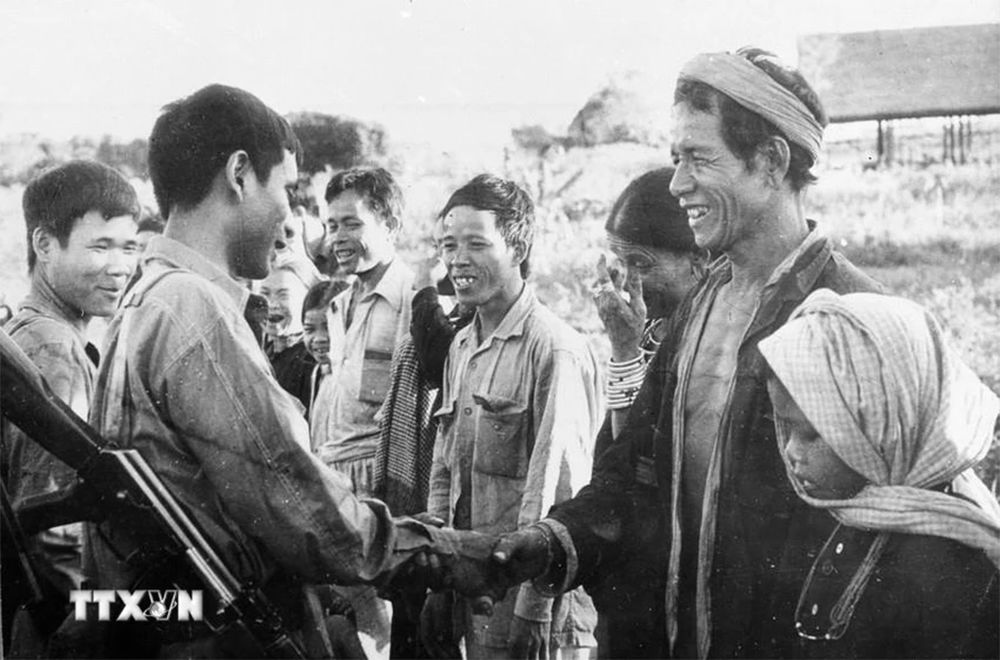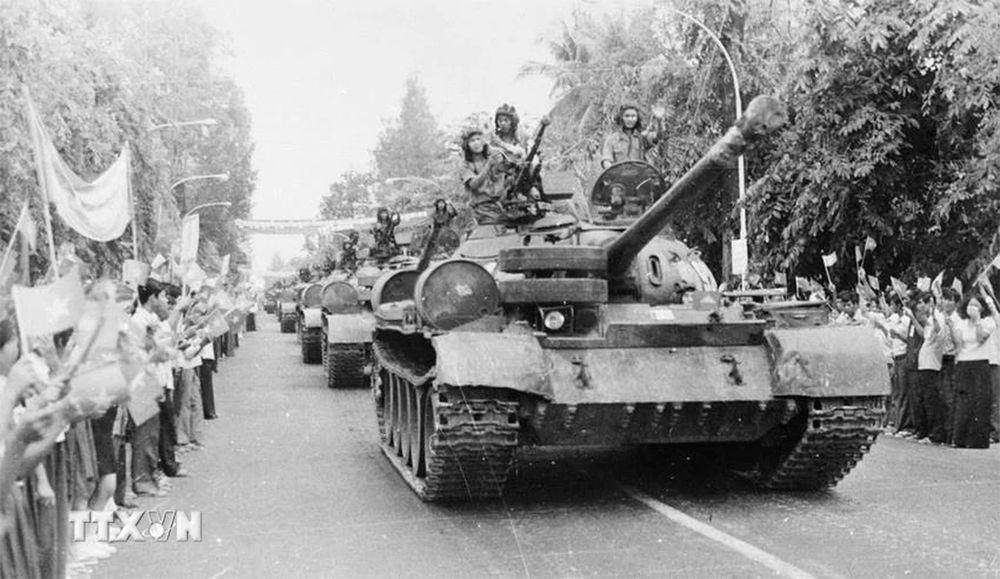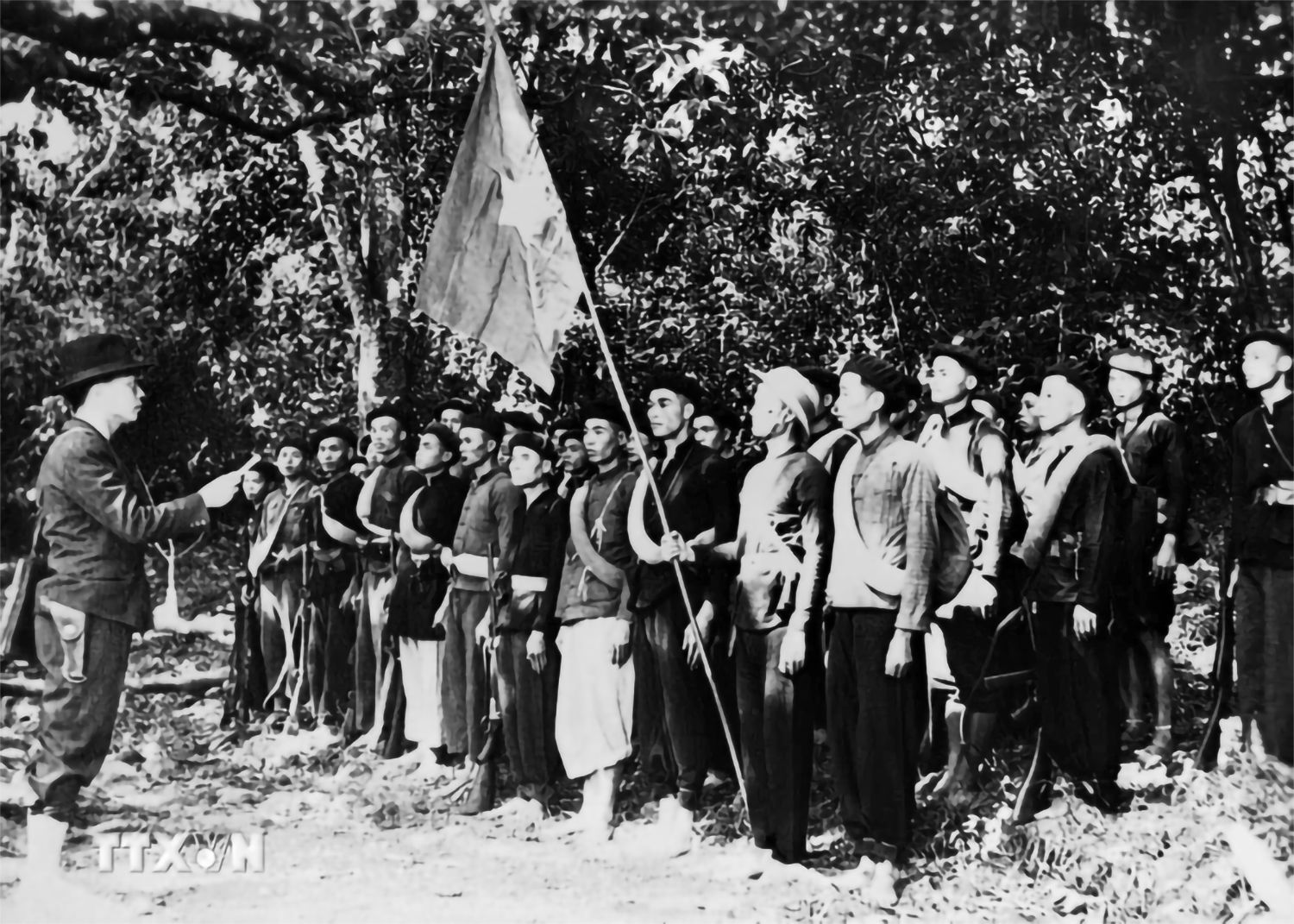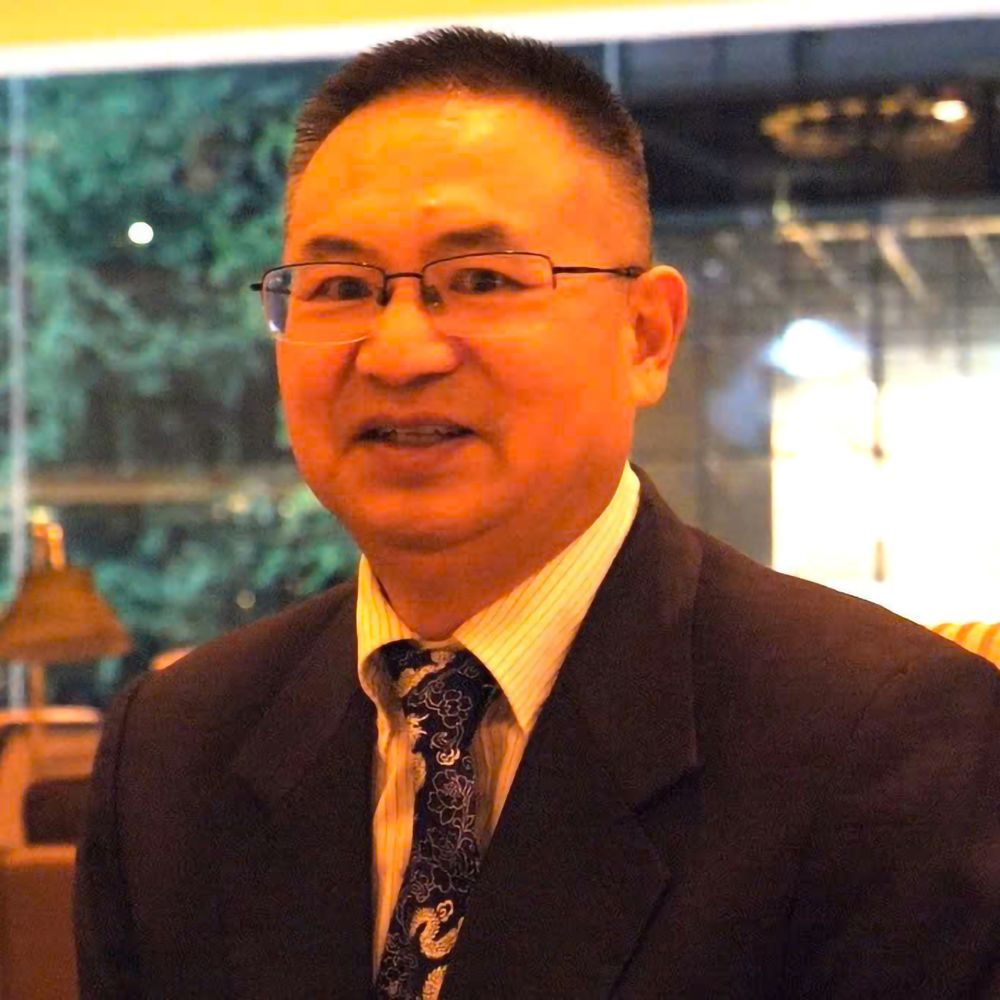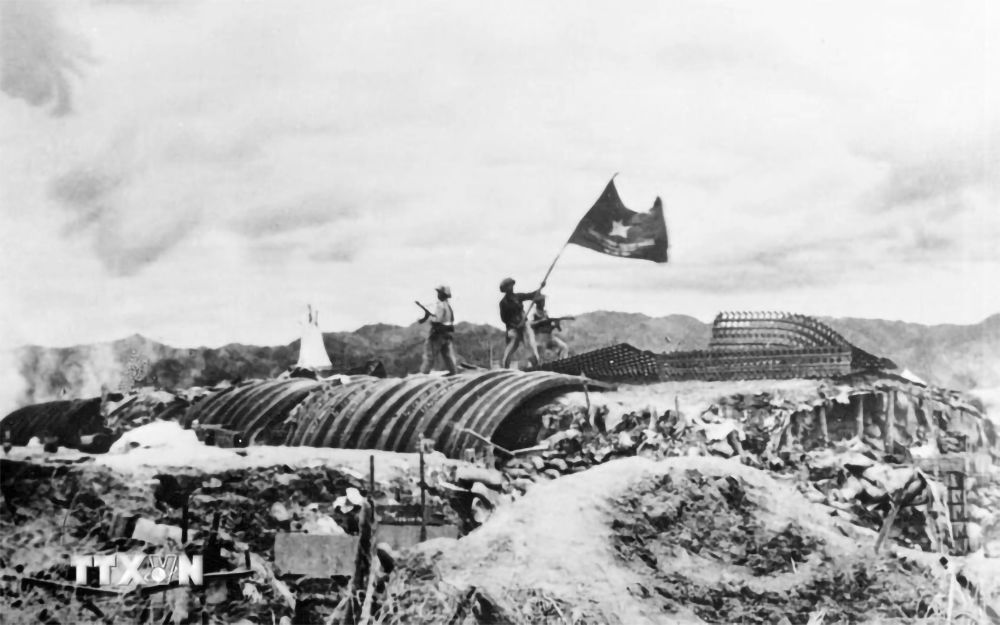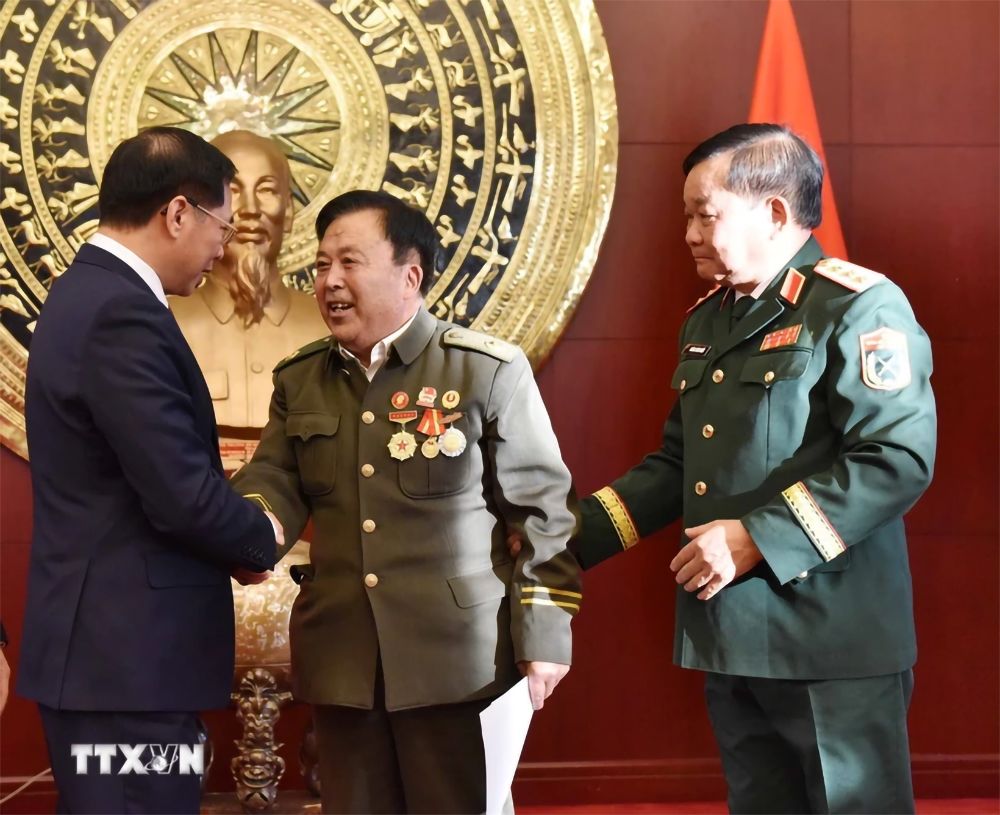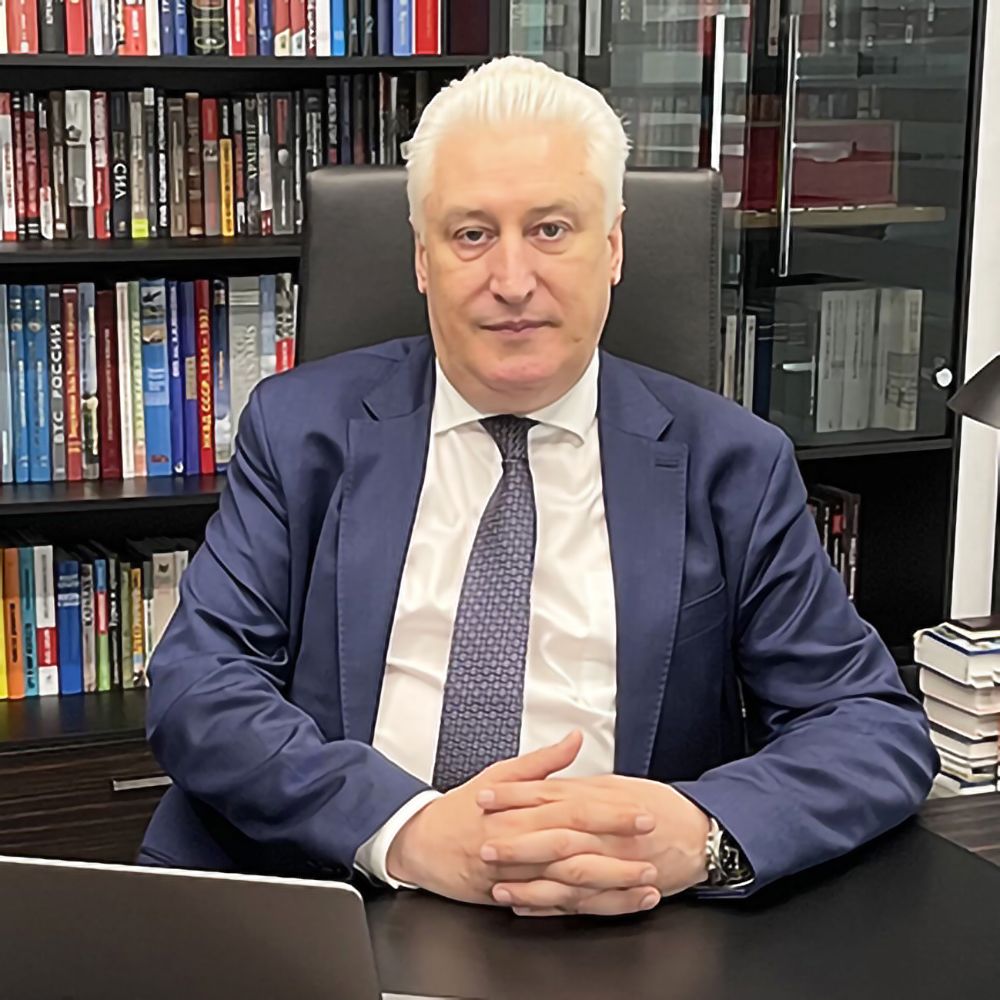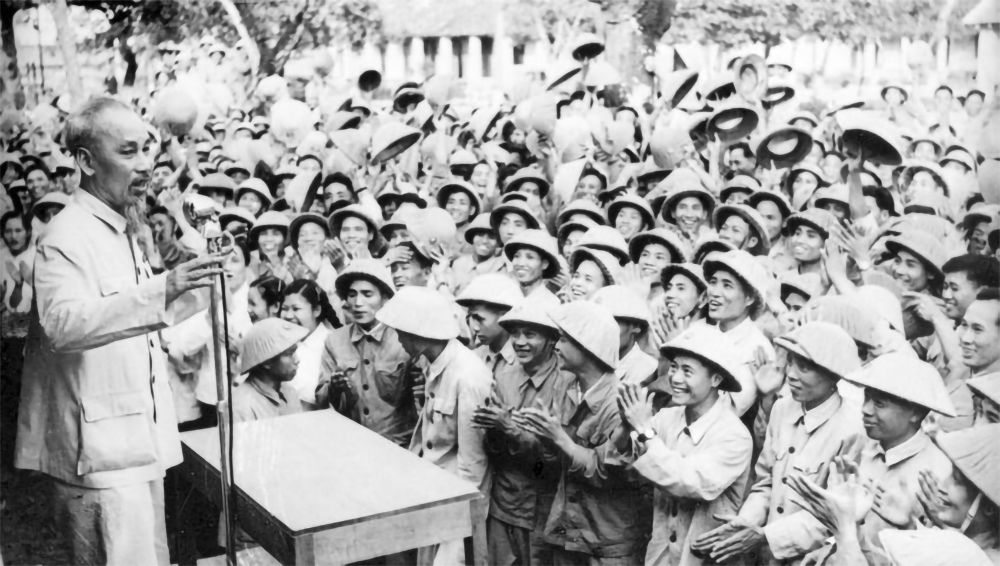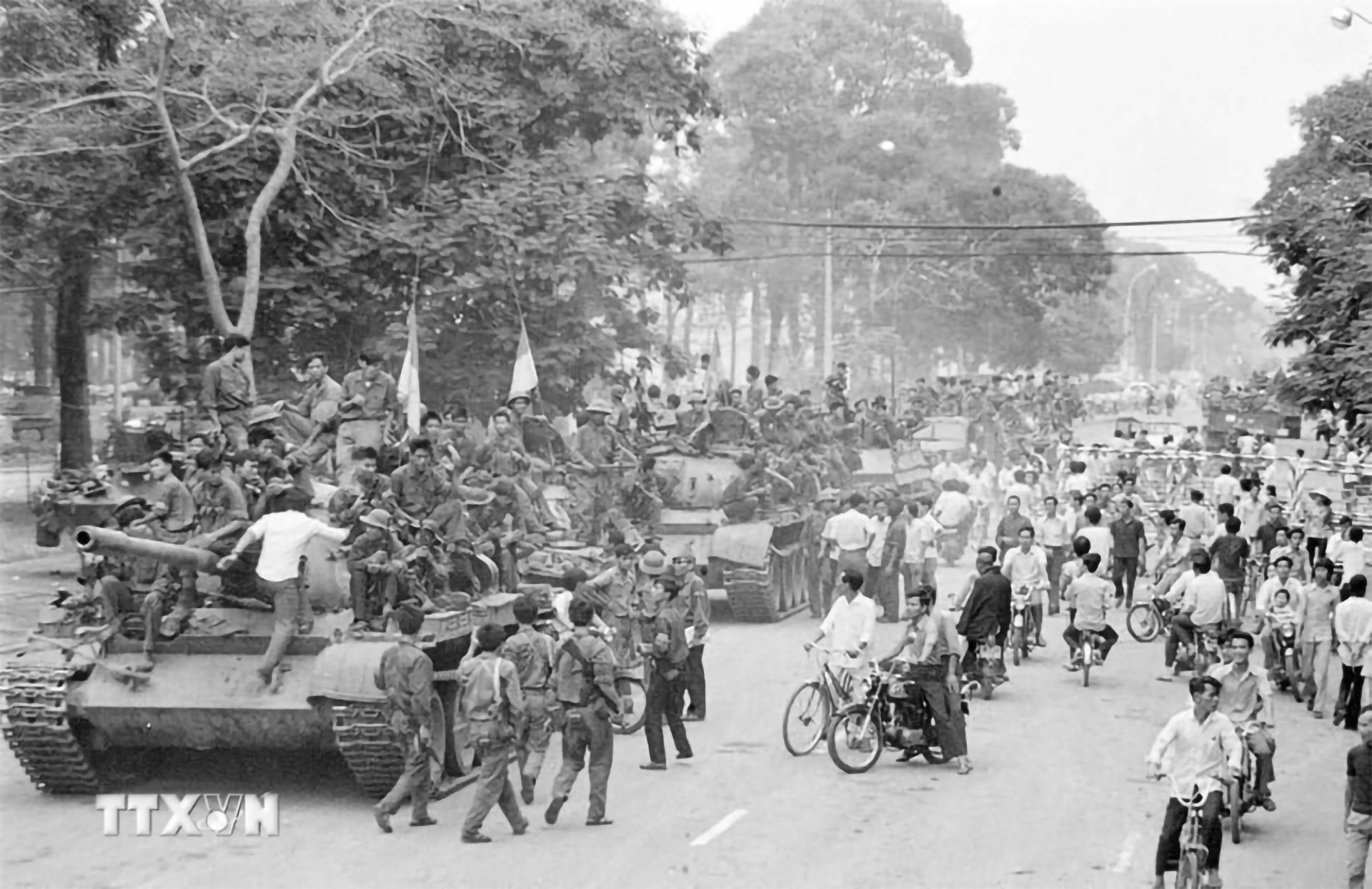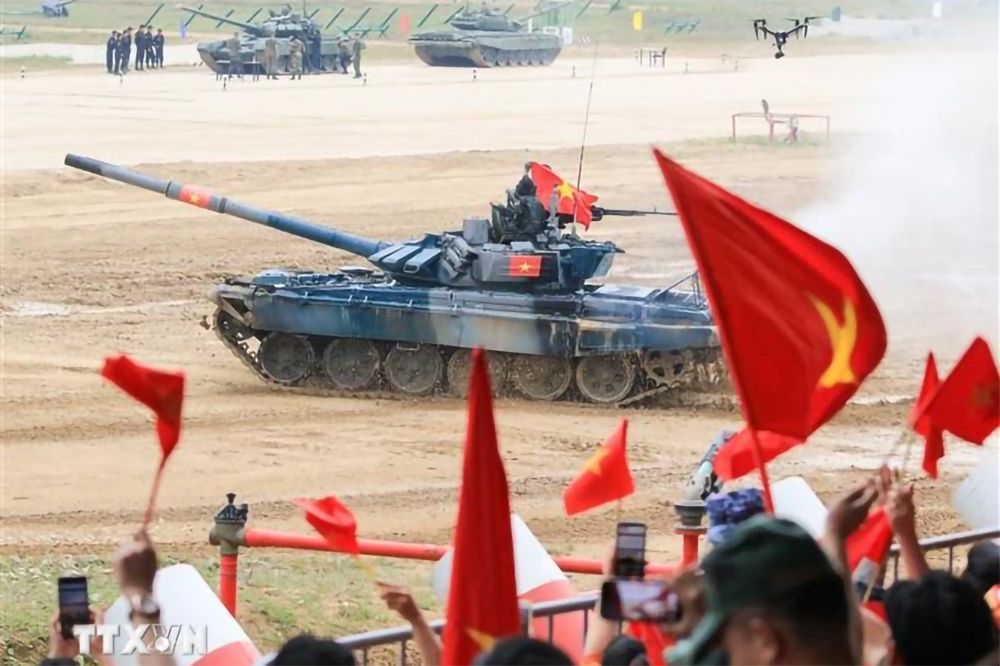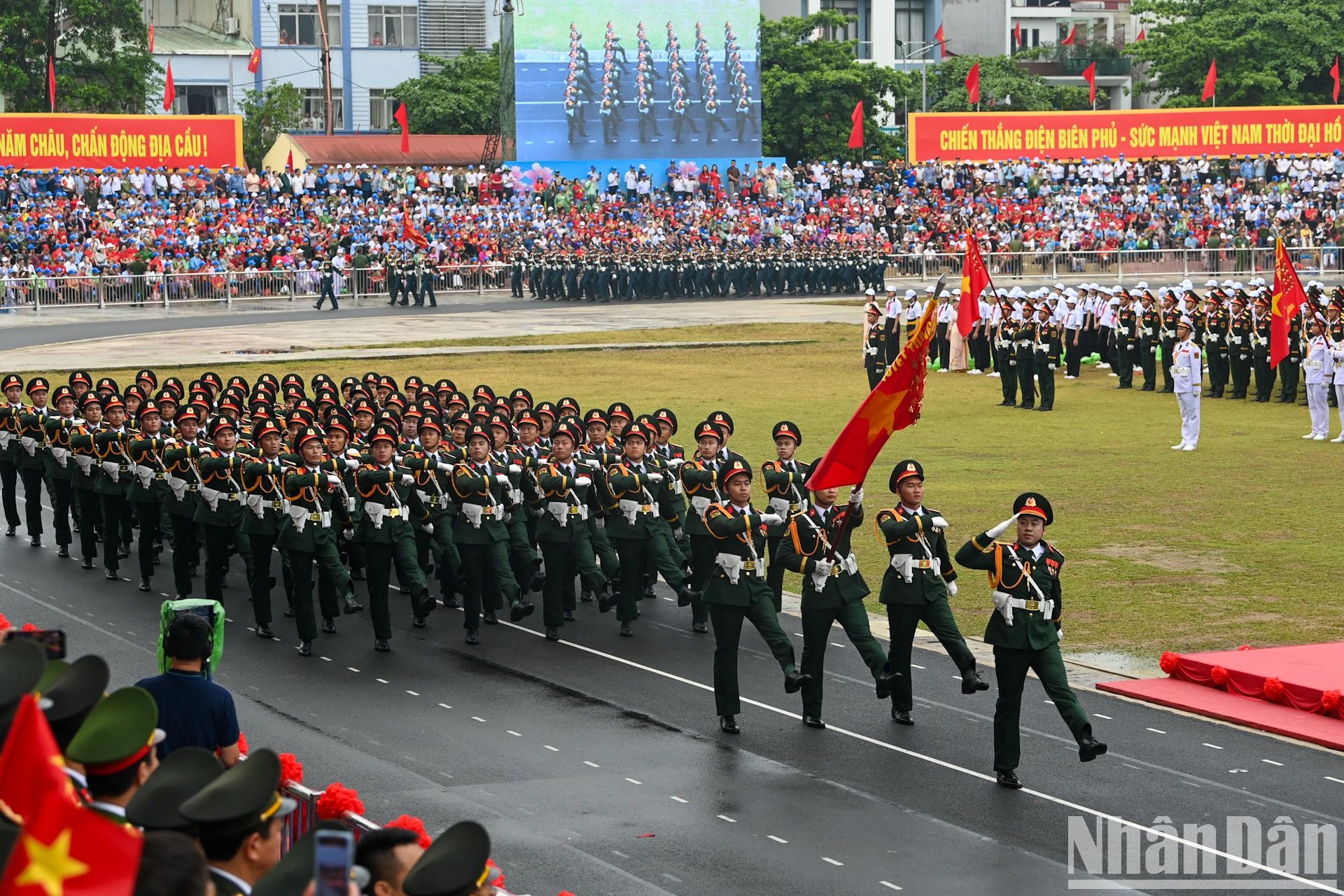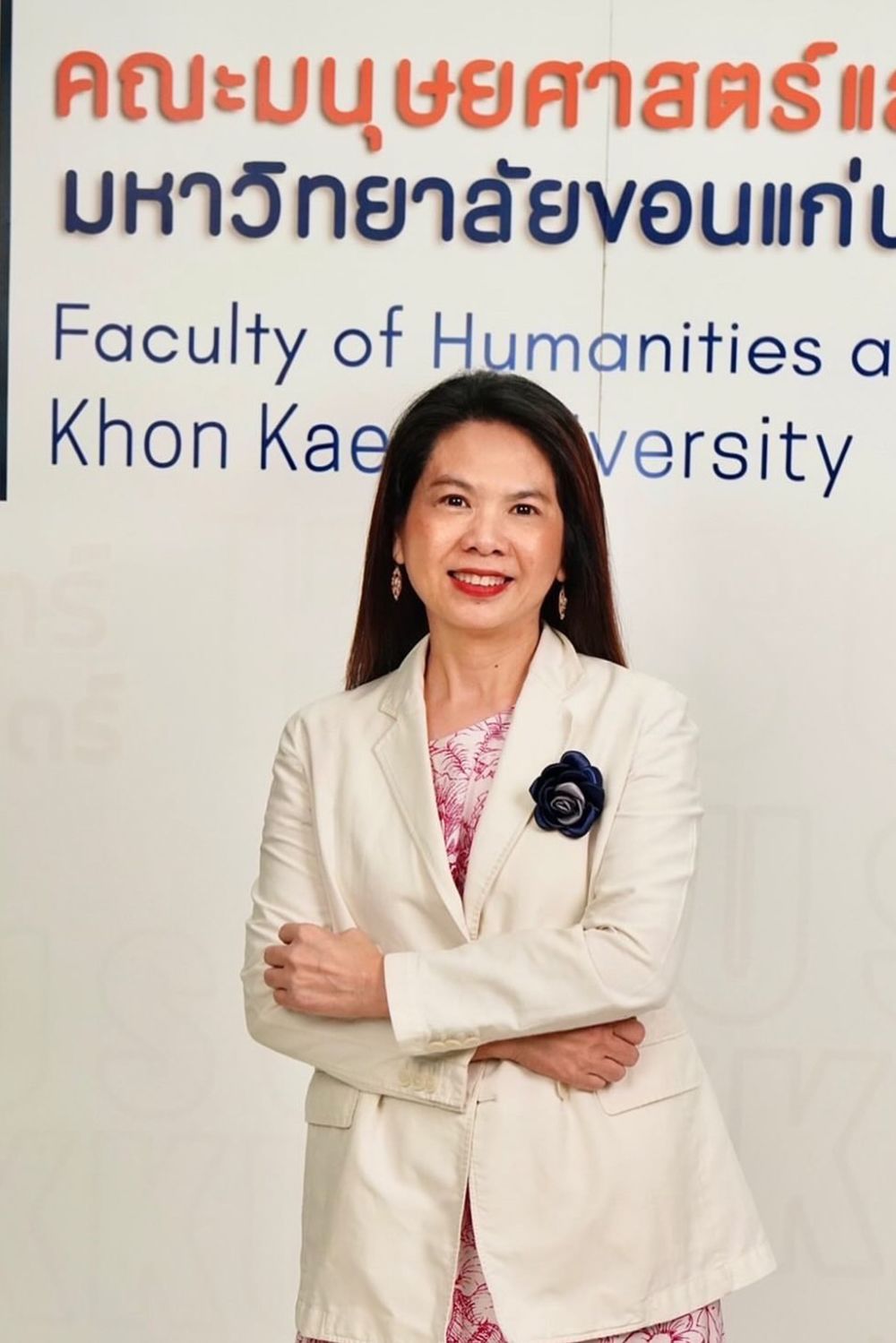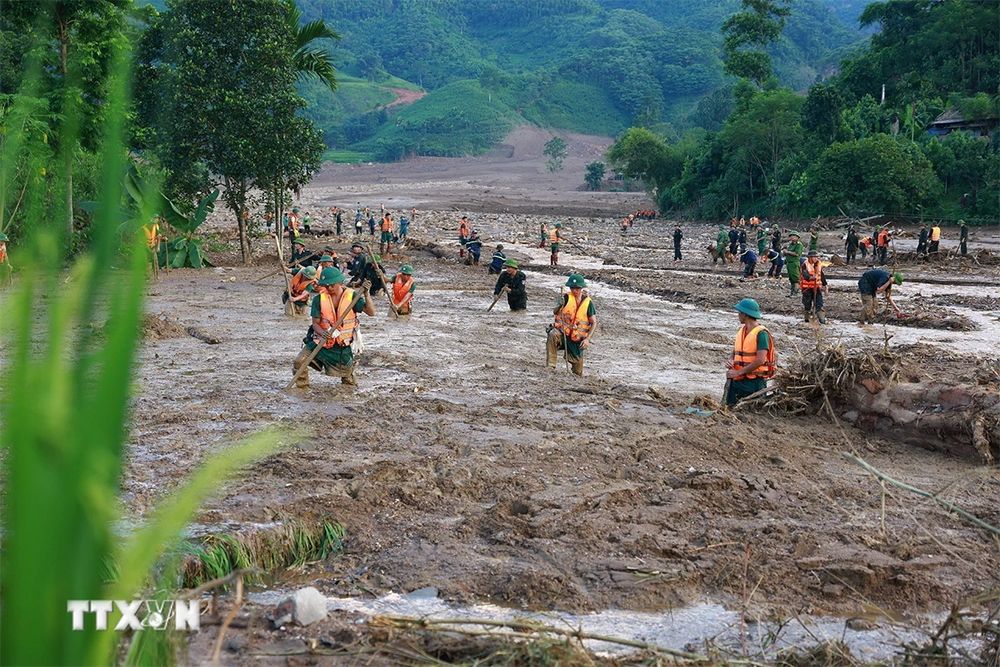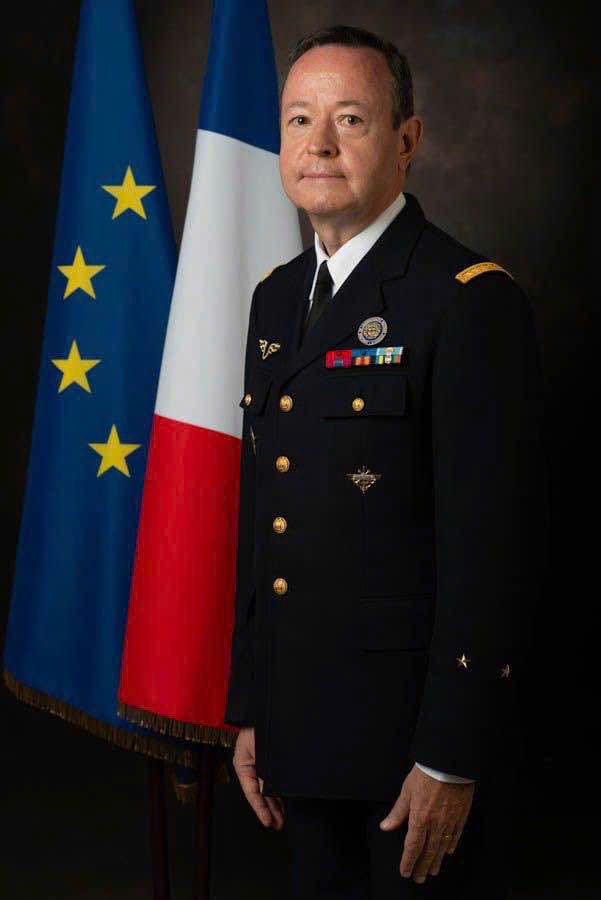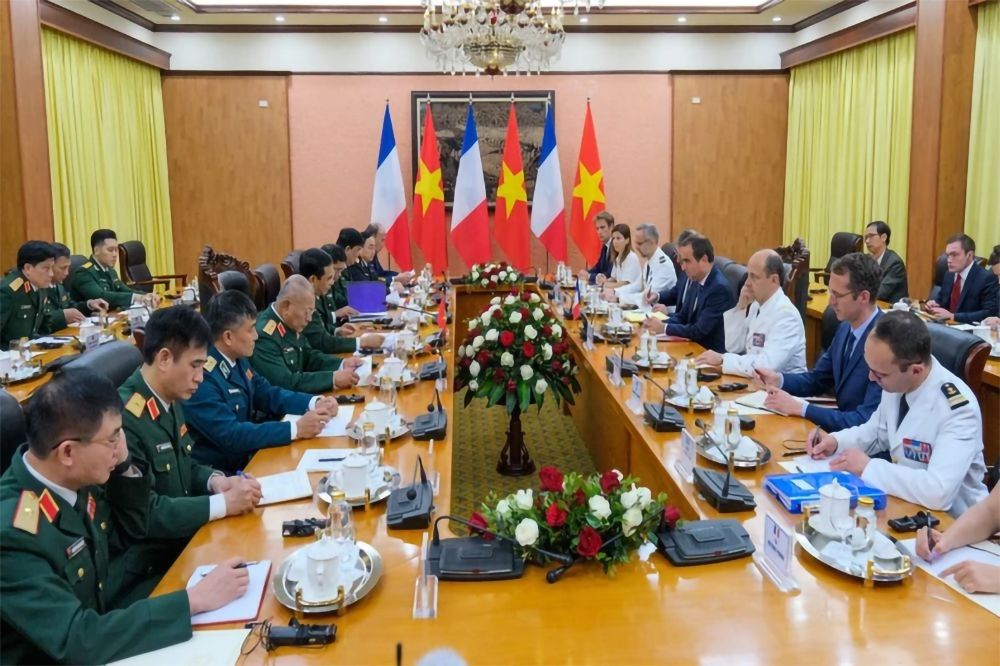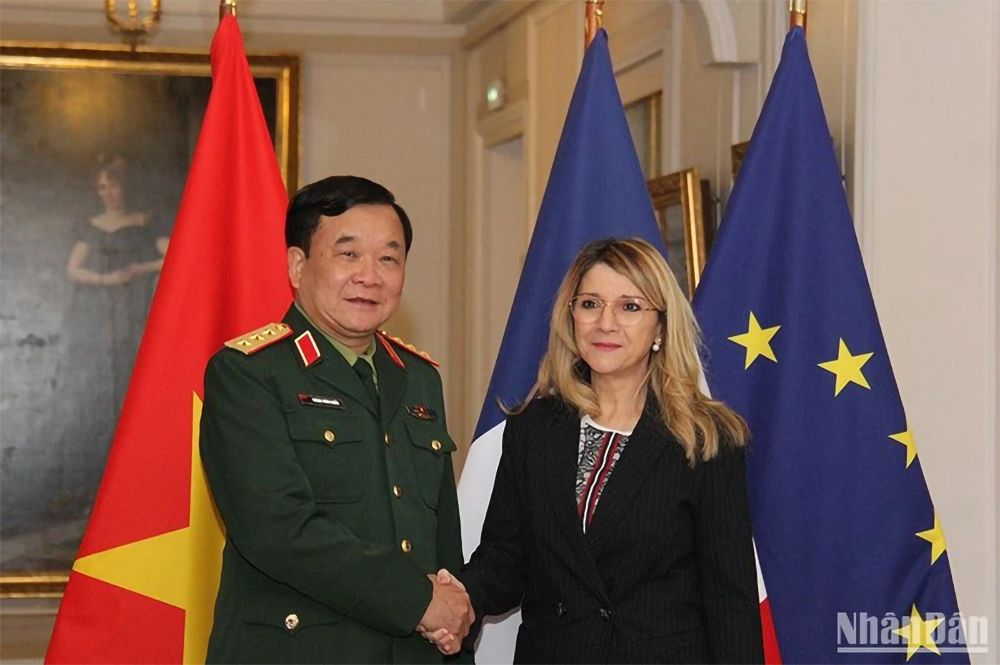Imprints of the Vietnam People’s Army in the hearts of international friends
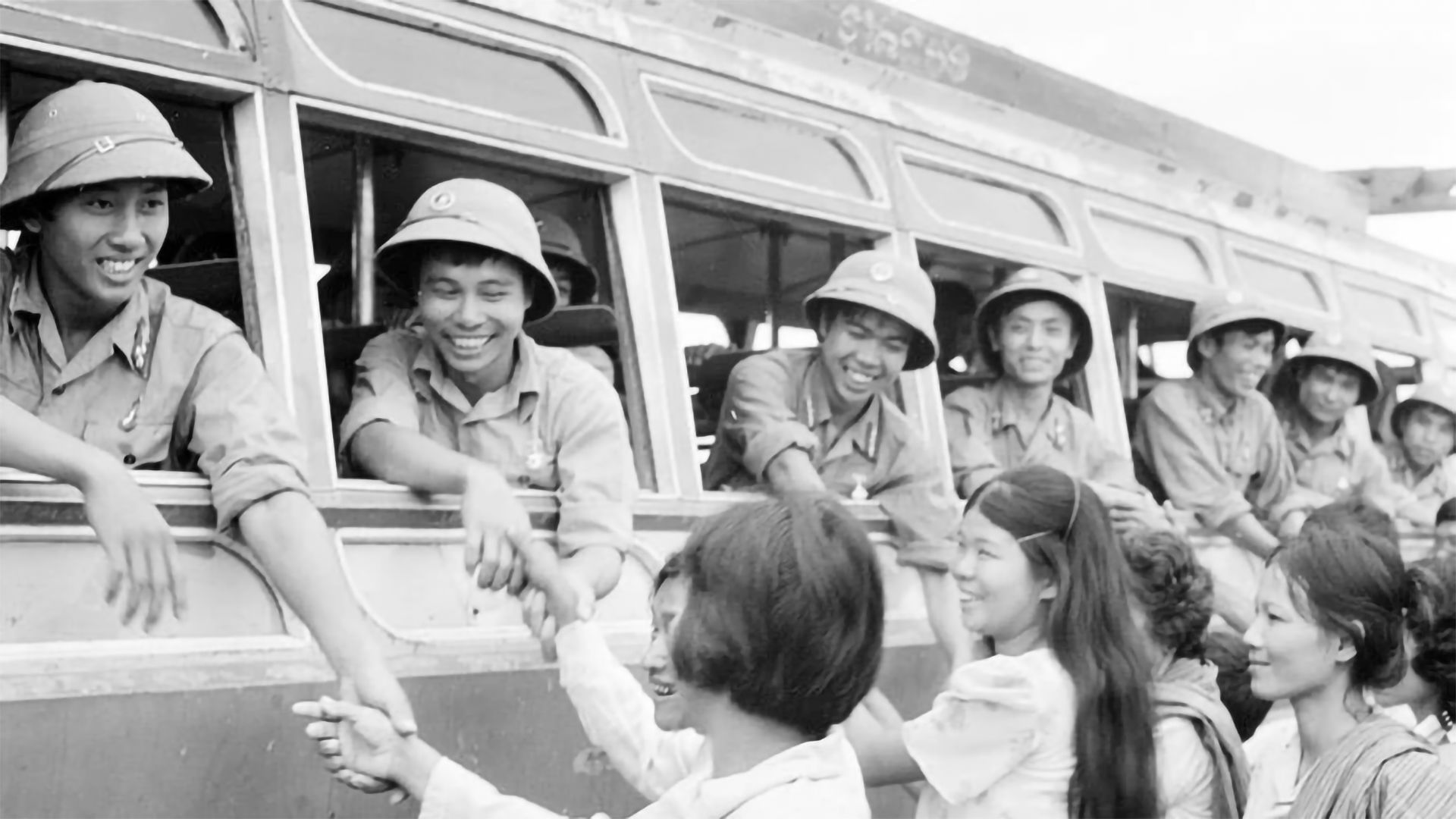
THE VIETNAM PEOPLE'S ARMY FULFILLS ITS INTERNATIONAL DUTY, HELPING CAMBODIA TO OVERTHROW THE GENOCIDE REGIME
Dr Ka Mathul, Royal Academy of Cambodia.
Dr Ka Mathul, Royal Academy of Cambodia.
According to Dr Ka Mathul from the Royal Academy of Cambodia, during the resistance war against France, Cambodia and Vietnam’s revolutionary forces united and fought together to regain independence from the colonial regime. From that period, the Vietnamese army showed its important role in fighting on all fronts.
“Here we can see that Vietnam has President Ho Chi Minh, an outstanding hero leading the movement to fight against oppression. He founded, educated, and trained soldiers in revolutionary ideology and fighting methods, building the Vietnamese army into the strongest army in Indochina, contributing significantly to the victory of the three countries of Cambodia, Laos, and Vietnam, in overthrowing the colonial regime”.
According to the researcher, after gaining independence from French colonialism, Vietnam and Cambodia continued to help each other in the resistance war against imperialist invaders. Vietnam liberated the South and reunified the country on April 30, 1975; Cambodia was liberated before that, on April 17, 1975.
The Cambodian revolutionary armed forces and Vietnamese volunteer soldiers coordinated training and improved combat techniques. (Photo: VNA)
The Cambodian revolutionary armed forces and Vietnamese volunteer soldiers coordinated training and improved combat techniques. (Photo: VNA)
“In Cambodia, as we know, after expelling the imperialists and their lackeys, the people hoped for peace, but the reality was contrary to that expectation. The Cambodian people suffered under the genocidal Pol Pot regime. They massacred their own people and the Vietnamese people.”
Dr Ka Mathul shared that in that situation, patriotic Cambodians rose up to establish the Cambodian United Front for National Salvation on December 2, 1978. The Front called for and received timely support and assistance from the Party, State, army and people of Vietnam. In fact, without the help of the Vietnamese Army at that time, it would not have been possible to defeat the Khmer Rouge.
“Peace in Cambodia was achieved thanks to the help of Vietnamese soldiers. I believe that it was the solidarity and close relationship between the armies of the two countries that helped liberate the Cambodian people from genocide. That is the most important survival factor. The brave Vietnamese soldiers sacrificed their blood and bones to save the Cambodian people from the “killing fields” caused by the Khmer Rouge regime for 3 years, 8 months and 20 days. Without that valuable and sincere help, the Cambodian people would probably no longer exist in their country.”
The people of Ratanakiri Province (northeast of Cambodia) welcome the Cambodian revolutionary armed forces and Vietnamese volunteer soldiers to liberate the villages and hamlets. (Photo: VNA)
The people of Ratanakiri Province (northeast of Cambodia) welcome the Cambodian revolutionary armed forces and Vietnamese volunteer soldiers to liberate the villages and hamlets. (Photo: VNA)
Affirming the great contributions of the Vietnam People’s Army over the years of helping the Cambodian people revive, overcome countless difficulties, and build and develop the country in peace and stability, scholar Ka Mathul expressed his joy at the defence cooperation relationship between the two countries which is currently being further strengthened and enhanced.
Thanks to the active and close cooperation mechanism, the two countries' armies regularly coordinate with agencies, units and localities to promptly prevent illegal cross-border activities, foil the sabotage plots of all reactionary forces, and maintain peace and peaceful life for the people of each country.
The Academy’s scholars said that in terms of training cooperation, since 1979, Vietnam has always received Cambodian military students to study long-term and short-term courses. The officers who have studied and trained in Vietnam have become a solid human resource for the Royal Army.
More than 30,000 residents of Phnom Penh bid farewell to soldiers of the 4th Corps (Cuu Long Corps) of the Vietnamese Volunteer Army who completed their international duty and returned home on May 3, 1983. (Photo: VNA)
More than 30,000 residents of Phnom Penh bid farewell to soldiers of the 4th Corps (Cuu Long Corps) of the Vietnamese Volunteer Army who completed their international duty and returned home on May 3, 1983. (Photo: VNA)
Ka Mathul also expressed joy at the fact that, while Vietnamese students studying in Cambodia were previously only civilians, military students are now coming to study the Khmer language. This shows that when both sides understand each other’s language, they develop a deeper mutual understanding. This helps make defence cooperation between the two countries increasingly effective.
“I think that the Vietnamese Army sending students to study the Khmer language in Cambodia is very meaningful. Today, in warfare, scientific and technical factors play an extremely important role. Regular meetings and exchanges between the two countries’ armies, enhanced mutual understanding and assistance in training, and coordination in crime prevention are very necessary.”
The deputy director of the International Relations Institute of Cambodia warmly congratulated the Vietnam People’s Army on its 80th founding anniversary, while expressing hope that the armies and peoples of both countries continue to build on the great achievements in their friendly cooperative relations, which King Norodom Sihanouk, President Ho Chi Minh, and many generations of leaders from both countries worked hard to build and cultivate.
On December 22, 1944, in a forest in Nguyen Binh District, Cao Bang Province, the Vietnam Propaganda Liberation Army was officially established. This was the first main force army of the revolutionary armed forces and is the predecessor of today's Vietnam People's Army. (Photo: VNA)
On December 22, 1944, in a forest in Nguyen Binh District, Cao Bang Province, the Vietnam Propaganda Liberation Army was officially established. This was the first main force army of the revolutionary armed forces and is the predecessor of today's Vietnam People's Army. (Photo: VNA)
Affirming the pivotal role of Vietnam-China defence cooperation
Professor Cheng Hanping, Director of the Vietnam Research Centre at the Zhejiang University
Professor Cheng Hanping, Director of the Vietnam Research Centre at the Zhejiang University
The armies of both countries fought side by side in the cause of national liberation, national reunification, and building socialism. Today, defence cooperation has truly become an important pillar, growing increasingly substantive within the overall comprehensive strategic cooperative partnership and the China-Vietnam community with a shared future that carries strategic significance.
This is the assessment of Professor Cheng Hanping, Director of the Vietnam Research Centre at Zhejiang University (China), when interviewed by the Nhan Dan Newspaper’s correspondent in China.
According to the Chinese scholar, the cooperative relationship between the two countries’ armies has a long history, with deep friendship formed through fighting side by side against colonial and imperialist aggression. In the 1950s, when China had just achieved nationwide victory, with many unhealed war wounds and an economy yet to recover, the Chinese Communist Party still decided to support Vietnam’s resistance against French colonialism, providing assistance in terms of manpower, resources, and military support. Notable figures such as Luo Guibo, Wei Guoqing, and Chen Geng effectively participated as political and military advisors and contributed to the historic victory at Dien Bien Phu.
On the afternoon of May 7, 1954, the Vietnamese army’s “Determined to Fight - Determined to Win” flag flew over General de Castries’ bunker. (Photo: VNA)
On the afternoon of May 7, 1954, the Vietnamese army’s “Determined to Fight - Determined to Win” flag flew over General de Castries’ bunker. (Photo: VNA)
During the two resistance wars against France and the US, China provided numerous weapons, ammunition, supplies, medicine, and essential goods to the Vietnamese army; assisted with treating wounded soldiers; and sent tens of thousands of personnel to participate in air defence, construction and repair of bridges and roads, essential infrastructure, transport, and mine clearance.
Vietnamese General Nguyen Son-Hong Thuy joined the Chinese revolution at the age of 16, experienced the Guangzhou Uprising, the Long March of the Red Army and the resistance war against Japan, and was the only foreigner to be promoted to general in the first batch of the Chinese People's Liberation Army. The anecdote about the General of both Vietnam and China has written a vivid historical story about the side-by-side solidarity and mutual assistance of the armies and people of Vietnam and China.
Having worked as an interpreter for delegations of the Vietnam People's Army visiting and working in China many times, Professor Doctor Cheng Hanping has witnessed and felt the great friendship and practical cooperation between the two armies over the years. To realise the six major directions indicating higher levels of cooperation, including "more substantive defence and security cooperation" in the bilateral relationship agreed upon by the top leaders of the two Parties and two countries, Cheng Hanping said that it is necessary to promote solid and substantive steps in Vietnam-China defence cooperation. Accordingly, the two countries' militaries need to increase trust, set out specific action plans and roadmaps, and jointly contribute to maintaining peace and stability in the region. As well as actively share information on counter-terrorism, countering “peaceful evolution” and colour revolution, and cooperate in human resource training.
The Central Military Commission and the Ministry of National Defence of Vietnam organised a meeting with Chinese veterans and experts who participated in helping the Vietnamese revolution on December 9, 2024, in Beijing. In the photo: Deputy Prime Minister and Minister of Foreign Affairs Bui Thanh Son (left) and Senior Lieutenant General Hoang Xuan Chien (right), Deputy Minister of National Defence, visit Chinese veterans. (Photo: VNA)
The Central Military Commission and the Ministry of National Defence of Vietnam organised a meeting with Chinese veterans and experts who participated in helping the Vietnamese revolution on December 9, 2024, in Beijing. In the photo: Deputy Prime Minister and Minister of Foreign Affairs Bui Thanh Son (left) and Senior Lieutenant General Hoang Xuan Chien (right), Deputy Minister of National Defence, visit Chinese veterans. (Photo: VNA)
Assessing the role of defence cooperation in the overall relationship between the two countries, Professor Dr Cheng Hanping said that Vietnam and China are both socialist countries, and the military is identified as "a sharp weapon to protect the State's institutions". Strengthening exchanges, cooperation, and communication between the two countries' militaries as a pillar in bilateral relations is extremely important, helping both sides together repel "peaceful evolution" in any form, firmly and effectively protecting the socialist regime. The Chinese scholar expressed hope that in the future, cooperation between the two countries' militaries will have substantial and steady progress in the direction of raising awareness to achieve a high level of strategic trust, delving into several specific and substantive areas of cooperation, becoming a symbol of strategic trust between the two sides.
THE ARMY IS ABSOLUTELY LOYAL TO THE PARTY AND THE PEOPLE
Senior military expert Igor Korotchenko, Editor-in-Chief of the Russian Defence Magazine. (Photo provided by the character)
Senior military expert Igor Korotchenko, Editor-in-Chief of the Russian Defence Magazine. (Photo provided by the character)
At the beginning of the conversation, Igor Korotchenko emphasised that the formation and development of the Vietnam People's Army was a pivotal moment in the nation's history, the most important event in the struggle against foreign colonialism to establish an independent Vietnam.
In Vietnam, people always remember the great contributions of President Ho Chi Minh - a wise revolutionary and outstanding military man of the Vietnamese people. In Russia, this great man is always remembered and respected. With the strength of his mind, will and intelligence, President Ho Chi Minh made history, opening a new era in the history of Vietnam.
President Ho Chi Minh directly founded, organised, educated and trained the Vietnam People's Army. (Photo: VNA)
President Ho Chi Minh directly founded, organised, educated and trained the Vietnam People's Army. (Photo: VNA)
As Vladimir Ilyich Lenin once said: "Ideology becomes a force once it has penetrated the masses." It was President Ho Chi Minh's theoretical and practical activities that helped the Vietnamese people escape the shackles of imperialism, giving birth to the Democratic Republic of Vietnam.
The Russian military expert affirmed that, to date, the Vietnam People’s Army is the only army in the world that has been able to defeat the US military in a direct military conflict. This is a remarkable victory from every perspective. First and foremost, it reflects the bravery and resilience of the Vietnamese military and people. From this triumph, the North and South were reunited to form the Socialist Republic of Vietnam.
The Russian people held the Vietnam People’s Army in high regard, praising it as a victorious, resilient, and highly-effective force. They recognised it as well-equipped, possessing a strong fighting spirit, and comprising an elite corps of soldiers who are absolutely loyal to the Party and the people.
On April 30, 1975, Saigon’s people rushed to the streets to welcome the Liberation Army. (Photo: VNA)
On April 30, 1975, Saigon’s people rushed to the streets to welcome the Liberation Army. (Photo: VNA)
Regarding Vietnam's current defence policy, the Editor-in-Chief of Russia's Defence Journal stated that Vietnam is a peace-loving and responsible nation with a significant role in the Asia-Pacific region. In the context of today's global situation, Vietnam continues to adhere to its "four no's" defence policy: refraining from joining military alliances, not allowing foreign military bases on Vietnamese territory, not using force nor threatening to use force in international relations, and maintaining independence in defence decisions.
Vietnam’s foreign policy is based on independence, self-reliance, and comprehensive international integration. In resolving disputes, Vietnam consistently advocates for peaceful measures in accordance with international law. This approach reflects Vietnam’s strategic mindset, developed from centuries of historical experience.
Discussing the defence cooperation between Vietnam and the Russian Federation, Igor Korotchenko shared that Russia and Vietnam have accumulated significant experience in recent years based on the enduring friendship and mutually beneficial collaboration over the past 70 years.
In December 2021, the defence ministers of the two countries signed an intergovernmental agreement on Russia-Vietnam military-technical cooperation and an interdepartmental memorandum of understanding on cooperation in the field of military history. Both sides have continued to maintain strategic dialogues on defence issues, recognising it as a particularly important form of cooperation.
The Vietnamese tank team competing at the 2022 Army Games in Russia. (Photo: VNA)
The Vietnamese tank team competing at the 2022 Army Games in Russia. (Photo: VNA)
Emphasising that Russia is a trusted partner of Vietnam in military-technical cooperation, Igor Korotchenko stated that Russia is always ready to support and facilitate the development of cooperation with Vietnam in this field.
According to the Russian military expert, in the current complex international context, Moscow and Hanoi can fully place trust in each other and continue pursuing a path to deepen their Comprehensive Strategic Partnership. In his congratulatory message to Comrade To Lam on his election as Party General Secretary, Russian President Vladimir Putin emphasised that Moscow remains committed to constructive dialogue and cooperation on urgent issues in the bilateral and international agenda.
Practically speaking, Hanoi and Moscow need to conduct regular strategic consultations to comprehensively assess the political-military situation in the Asia-Pacific region and its development trends. They should jointly analyse security risks and threats, as well as research and propose measures to counteract negative and dangerous trends.
Congratulating the Vietnam People’s Army on its 80th founding anniversary, expert Igor Korotchenko affirmed that the peoples and armies of both countries will always cherish their enduring friendship and brotherhood which have stood the test of time and trials.
A parade commemorating the 70th Anniversary of the Dien Bien Phu Victory. (Photo: NDO)
A parade commemorating the 70th Anniversary of the Dien Bien Phu Victory. (Photo: NDO)
THE VIETNAM PEOPLE’S ARMY ORIGINATES FROM THE VIETNAMESE PEOPLE
Associate Professor, Doctor Thananan Boonwanna, a Thai historian
Associate Professor, Doctor Thananan Boonwanna, a Thai historian
Vietnam is a country that has undergone many difficulties and struggles, with long-lasting battles to defend the country against foreign invaders. I have researched the resistance against French colonialism and learned that several Vietnamese soldiers sacrificed themselves to carry weapons to high points or carried out suicide bombings to destroy tanks during battles with the French. Ultimately, the Vietnamese people won with the Dien Bien Phu Campaign, changing the fate of the Vietnamese nation.
I also learned about the Ho Chi Minh Campaign, where the Vietnamese armed forces defeated the US imperialists, forcing the US to completely withdraw from Vietnam.
I believe that the Vietnam People’s Army comes from the Vietnamese people, and today, the Vietnam People’s Army plays an increasingly important role in society, as it has helped the people in the aftermath of Typhoon No. 3 (Yagi).
The military forces search for missing victims due to landslides in Lang Nu Village, Phuc Khanh Commune, Bao Yen District (Lao Cai). (Photo: VNA)
The military forces search for missing victims due to landslides in Lang Nu Village, Phuc Khanh Commune, Bao Yen District (Lao Cai). (Photo: VNA)
DEFENCE COOPERATION, A BRIGHT SPOT IN VIETNAM-FRANCE RELATIONS
Brigadier General Didier Oustric, Head of International Relations at the French Directorate of Higher Military Education
Brigadier General Didier Oustric, Head of International Relations at the French Directorate of Higher Military Education
France was the first Western country to establish defence relations with Vietnam (since 1991), even though historically, the two countries were once adversaries on the battlefield. With the spirit of “closing the past, looking towards a better future,” defence cooperation between the two countries has seen significant development. Air Force Brigadier General Didier Oustric, Head of International Relations at the French Directorate of Higher Military Education, believes that defence cooperation is a bright spot in Vietnam-France relations for peace, stability, and the common development of the region and the world.
Brigadier General Didier Oustric shared: The year 2024 marks the 70th anniversary of the Dien Bien Phu battle and the end of the war in Indochina, a prolonged and painful conflict for both the Vietnamese and French armies. For the first time, the French Minister of Armed Forces, Sébastien Lecornu, was officially invited by the Vietnamese Government to visit Vietnam on May 6-7, 2024, to attend the commemoration of this historical event at the famous Dien Bien Phu battlefield. This was an opportunity to share history and honour the martyrs from both sides. It is important to understand that the two countries have gone through a long process of reconciliation, marked by many stages. One of the most important stages was the signing of the Comprehensive Strategic Partnership in 2024.
This positive development brings special emotions for Brigadier General Didier Oustric, as he had the honour of serving as the Defence Attaché at the French Embassy in Hanoi from 2009 to 2012. Previously, he had the opportunity to become one of the participants in the process of resuming defence cooperation between the two countries, as he was the first French and European officer to be admitted to study at a Vietnamese military academy.
Minister of Defence Phan Van Giang held talks with French Minister of Armed Forces Sébastien Lecornu in Hanoi on May 5, 2024.
Minister of Defence Phan Van Giang held talks with French Minister of Armed Forces Sébastien Lecornu in Hanoi on May 5, 2024.
French-Vietnamese defence cooperation began in 1991, with the establishment of the Defence Attaché Office at the French Embassy in Hanoi. At that time, cooperation was mainly between the medical services of both armed forces. Even during the colonial period, French military doctors left behind beautiful memories, especially Alexandre Yersin, a military doctor who lived in Vietnam for many years. Since the early 1990s, France has trained over 120 doctors and pharmacists from the Vietnam People’s Army at its military hospitals, including the famous Val de Grace Hospital in Paris.
Over the years, French military doctors specialising in tropical diseases, with the assistance of the Vietnamese military, have conducted working trips to remote areas, such as the Central Highlands, to collect samples for developing malaria treatment methods. With this support, several tropical diseases have been pushed back in Vietnam by the early 21st century.
Previously, teaching the French language was reinitiated for Vietnamese officers many years after the war in Indochina ended. Annually, French-speaking Vietnamese officers are granted a certain number of study slots at prestigious military training schools in France. These officers play a crucial role in enhancing bilateral defence cooperation. Some French officers, including Didier Oustric, have studied at the National Defence Academy in Hanoi.
Since the 1990s, visits by French naval ships have provided opportunities to establish relations with the Vietnamese Navy, during the visits, ceremonial activities have been organised. This also allows France to demonstrate its presence in the region and reaffirm its commitment to respecting maritime freedom.
Secretary of State for Veterans and French War Memory Patricia Miralles, and Deputy Minister of Defence Hoang Xuan Chien (Photo: Khai Hoan)
Secretary of State for Veterans and French War Memory Patricia Miralles, and Deputy Minister of Defence Hoang Xuan Chien (Photo: Khai Hoan)
In addition to these diverse cooperative activities, strategic dialogues have been held between research institutes under the defence ministries of both countries to exchange assessments regarding the geostrategic situation in the Asia-Pacific region. These political-military exchanges are supported by reciprocal visits from senior military officials and chiefs of armed forces. During my tenure as a defence attaché, I had the honour of hosting French Minister of the Armed Forces Hervé Morin in Hanoi during his first ministerial visit since the end of the Indochina War. Since then, other French ministers have visited Vietnam, with the most recent visits being made by Minister of the Armed Forces Sébastien Lecornu.
One of the undoubted successes of France-Vietnam defence cooperation is training for peacekeeping operations. For nearly a decade, over 800 Vietnamese soldiers, who had never participated in any overseas missions before, have been deployed under United Nations frameworks in the Central African Republic or South Sudan. They serve as military doctors or engineers. France has supported Vietnam by sending experts to participate in training efforts, including teaching French to Vietnamese soldiers preparing for UN peacekeeping missions in French-speaking countries. This exemplifies the strong friendship between the defence ministries of both nations.
According to Major General Didier Oustric, current France-Vietnam defence cooperation is fruitful and is maintained through regular exchanges at various levels, most importantly through Strategic Dialogue and Defence Cooperation held alternately each year in Hanoi or Paris. The positive results achieved and a shared understanding between the two countries regarding their vision for this relationship create important foundations for both sides to continue striving for peace, stability, and mutual development in the region and the world, corresponding to the Vietnam-France comprehensive strategic partnership.
Published: December 2024
Production managers: Chu Hong Thang - Pham Truong Son
Content: Nguyen Hiep - Huy Vu - Huu Hung - Xuan Hung - Xuan Son - Dinh Truong - Khai Hoan - Minh Duy
Translation: NDO
Design: Hoang Ha


